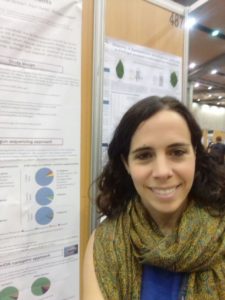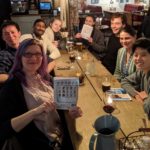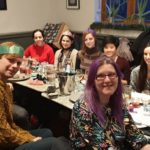FEMS Microbiology Conference 2017

In the middle of July, I attended the FEMS Microbiology Conference in Valencia. This is a general microbiology meeting that covers many different areas such as: antimicrobial resistance and infections, food microbiology, sustainability, and climate change. This conference is a great place to get new ideas and inspiration from different microbiology-based research fields.
I really enjoyed the scheduled sessions linked to the gut microbiome. Max Nieuwdorp´s (University of Amsterdam, Netherlands) talk was great – he presented his studies on the human gut microbiota and its link to insulin resistance. Catherine Stanton´s (Teagasc Food Research Centre, Ireland) talk was very interesting, highlighting how microbial-dervied products such as metabolites can impact host health. Lindsay was also scheduled in the same session, and gave a great presentation on Kevin and Lukas´s work on how Bifidobacterium breve can reduce pathological epithelial cell shedding in a pre-clinical model, which could end up having practical applications for potential future microbiota therapies in inflammatory bowel disease (IBD) patients. Ian in our lab is currently carrying on with this project.
There was also a fantastic public engagement focused session relating to the microbiome. The talk by Alan Walker (University of Aberdeen, UK) was my favourite – in 30 minutes he engaged us summarising all the forefronts and challenges the microbiome field is facing at the moment such as microbiome human diversity and links to human health, culturomics, sequencing data, microbiota therapies, faecal transplant…Joanna Verran (Manchester Metropolitan University, UK) chaired the session – she has done lot of educational workshops on the microbiome, and presented great work from artists in this session.
I also enjoyed presenting my work during one of the poster sessions. I was asked lots of questions about my microbiota and MinION work (this is a new and exciting sequencing platform by Oxford Nanonpore), and our study on the importance of optimising sample processing, and sequencing for profiling preterm infant gut microbiota samples (including the different hypervariable regions of the 16S rRNA gene). I enjoyed talking to people about their posters as well, in fact I devoted quite a lot of time to this – it is a great opportunity to network and share ideas on a one-to-one basis!
Other great talks were given by Willem Van Schaik (University of Birmingham, UK) who introduced his novel technology to assess the human gut ‘resistome’ (i.e. all the antimicrobial resistance genes present in the gut microbiota, and using nanolitre-scale quantitative PCRs), and Roy Kishony (Harvard Medical School, US) with fascinating video images from his Mega-Plate Petri dish and how they followed generation of new mutations in relation to higher concentrations of antibiotics. All in all, it was very informative and good fun to attend this conference.






